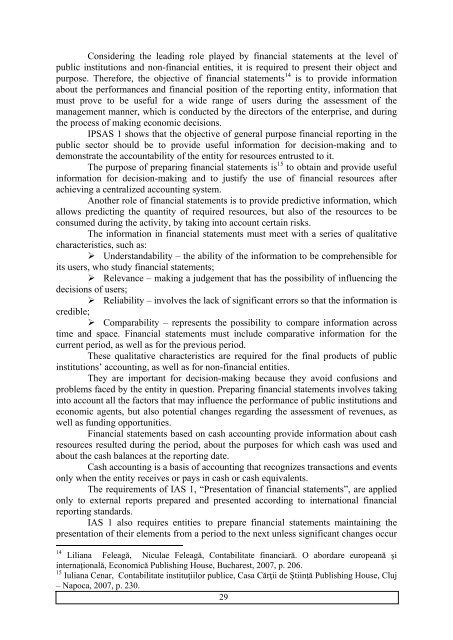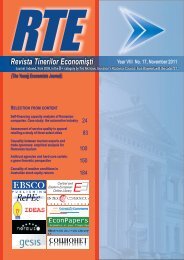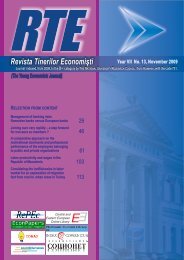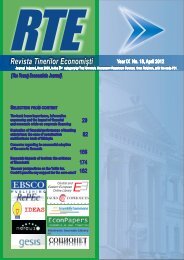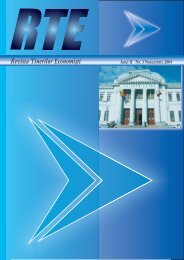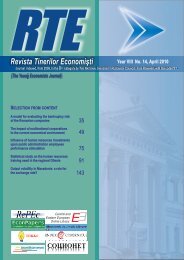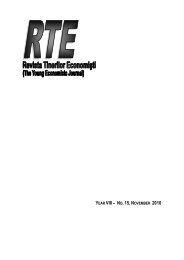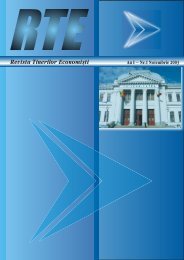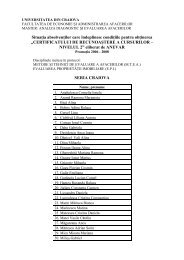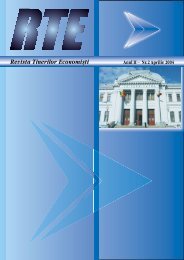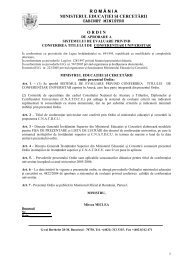Revista Tinerilor Economiºti (The Young Economists Journal)
Revista Tinerilor Economiºti (The Young Economists Journal)
Revista Tinerilor Economiºti (The Young Economists Journal)
Create successful ePaper yourself
Turn your PDF publications into a flip-book with our unique Google optimized e-Paper software.
Considering the leading role played by financial statements at the level of<br />
public institutions and non-financial entities, it is required to present their object and<br />
purpose. <strong>The</strong>refore, the objective of financial statements 14 is to provide information<br />
about the performances and financial position of the reporting entity, information that<br />
must prove to be useful for a wide range of users during the assessment of the<br />
management manner, which is conducted by the directors of the enterprise, and during<br />
the process of making economic decisions.<br />
IPSAS 1 shows that the objective of general purpose financial reporting in the<br />
public sector should be to provide useful information for decision-making and to<br />
demonstrate the accountability of the entity for resources entrusted to it.<br />
<strong>The</strong> purpose of preparing financial statements is 15 to obtain and provide useful<br />
information for decision-making and to justify the use of financial resources after<br />
achieving a centralized accounting system.<br />
Another role of financial statements is to provide predictive information, which<br />
allows predicting the quantity of required resources, but also of the resources to be<br />
consumed during the activity, by taking into account certain risks.<br />
<strong>The</strong> information in financial statements must meet with a series of qualitative<br />
characteristics, such as:<br />
� Understandability – the ability of the information to be comprehensible for<br />
its users, who study financial statements;<br />
� Relevance – making a judgement that has the possibility of influencing the<br />
decisions of users;<br />
� Reliability – involves the lack of significant errors so that the information is<br />
credible;<br />
� Comparability – represents the possibility to compare information across<br />
time and space. Financial statements must include comparative information for the<br />
current period, as well as for the previous period.<br />
<strong>The</strong>se qualitative characteristics are required for the final products of public<br />
institutions’ accounting, as well as for non-financial entities.<br />
<strong>The</strong>y are important for decision-making because they avoid confusions and<br />
problems faced by the entity in question. Preparing financial statements involves taking<br />
into account all the factors that may influence the performance of public institutions and<br />
economic agents, but also potential changes regarding the assessment of revenues, as<br />
well as funding opportunities.<br />
Financial statements based on cash accounting provide information about cash<br />
resources resulted during the period, about the purposes for which cash was used and<br />
about the cash balances at the reporting date.<br />
Cash accounting is a basis of accounting that recognizes transactions and events<br />
only when the entity receives or pays in cash or cash equivalents.<br />
<strong>The</strong> requirements of IAS 1, “Presentation of financial statements”, are applied<br />
only to external reports prepared and presented according to international financial<br />
reporting standards.<br />
IAS 1 also requires entities to prepare financial statements maintaining the<br />
presentation of their elements from a period to the next unless significant changes occur<br />
14<br />
Liliana Feleagă, Niculae Feleagă, Contabilitate financiară. O abordare europeană şi<br />
internaţională, Economică Publishing House, Bucharest, 2007, p. 206.<br />
15<br />
Iuliana Cenar, Contabilitate instituţiilor publice, Casa Cărţii de Ştiinţă Publishing House, Cluj<br />
– Napoca, 2007, p. 230.<br />
29


